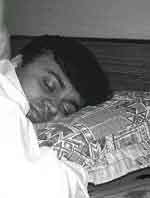Sleepless in USA
 thousands of Americans woke up to sleep recently as the us celebrated its National Sleep Awareness Week. And judging by a national survey, most Americans are still in the dark when it comes to sleep; of the vital role it plays in all our lives and the hazards of not getting enough of it. And ignorance, is certainly not proving to be bliss for a lot of them.
thousands of Americans woke up to sleep recently as the us celebrated its National Sleep Awareness Week. And judging by a national survey, most Americans are still in the dark when it comes to sleep; of the vital role it plays in all our lives and the hazards of not getting enough of it. And ignorance, is certainly not proving to be bliss for a lot of them.
The survey, whose results can help people the world over to understand a physical need we have all learned take for granted, showed that every adult needs at least eight to nine hours of sleep daily. Most, however, get only seven, and nearly one-third of the 1,027 people studied get six hours or even less in a work week.
Two-thirds of those surveyed reported having a sleep-related problem, like insomnia, snoring or "restless leg syndrome', which cause an involuntary twitching of the leg muscles and resulting muscular discomfort. However, of these people, only a mere five per cent ever took up their problems with a medical practitioner. More than a third said confessed that they often felt so sleepy during the day, that it actually affected their activities.
Twenty-three per cent admitted to falling asleep frequently at the wheel in the past year. The us National Highway Traffic Safety Administration gave some frightening figures: they estimate that drowsy drivers are responsible for as many as 100,000 car crashes, 1,500 vehicular deaths and 71,000 injuries every year in the us .
Now, to the physiological side of this bed-time story. Our sleep needs are biologically determined. Some people need only six hours at night, while some cannot do with any less than 10. However, for most adults, eight hours of sleep in required to function optimally.
In fact, before the widespread use of the light bulb in the early 1900s and before distractions like televisions and the Internet, a more modern substitute for the idiot box, the average adult slept for about nine hours a night. And recently conducted studies have shown that when all clues to time are removed and people are permitted to sleep for as long as they choose, they sleep for about 10.3 hours out of every 24, just as apes and monkeys do.
Stanley Coren, a neuropsychologist at the University of British Columbia, has estimated that thanks to our modern, "hi-tech, clock-driven life style', Americans now accumulate a sleep debt that amounts to an average of almost 500 hours each year. Naomi Breslau and her colleagues at the Sleep disorder Center in Detroit reported in 1997 that an increase in daytime sleepiness can be detected after a mere one-hour sleep loos. In a study of 1,007 young adults, these researchers found that the people most likely to be sleepy during the day were those who were unmarried and working full-time, those who snored and those with a history of major depression.
Although most people tend to minimise the effects of insufficient sleep as simply feeling a bit tired, studies of sleep-deprived people have shown that they are less efficient and more irritable.
Resting is not an adequate substitute for sleep. If you get sleepy when you are bored or sitting quietly in a warm or dark room or trying to listen to a concert or a lecture, you are sleep-deprived. The Washington-based us National Sleep Foundation, a nonprofit organisation, noted, "Boredom does not cause sleepiness, it merely unmasks it.'
The foundation also gave a few tips for the sleep-deprived: avoid coffee, cigarettes and alcohol in the late afternoon and evening; exercise regularly, but do it at least three hours before bedtime; establish a relaxing bedtime routine like a hot bath before sleep; go to sleep and wake up at the same time every day, and if you have problems falling asleep at night, avoid daytime naps.
And contrary to what most people believe, our sleep needs do not change with age. But it is true that many older people frequently experience troubled sleep due to certain physiological factors. And those who sleep less at night might have to compensate by a morning or an afternoon nap. The foundation suggests that people with sleep disorders should contact sleep specialists. Loud snoring, for instance, can be a symptom of sleep apena, a cessation of breathing occurring frequently each night and often, with the people ever realising it, can lead to disturbed sleep and even extreme sleepiness during the day. Moreover, this is a disorder that, if left untreated, can turn fatal and cause serious accidents, high blood pressure and even sudden death. The foundation says that because we are so accustomed to taking sleep as just another regular bodily activity, that serious problems are often taken lightly. Sleep problems are treatable, but failing to treat them can be a very expensive bargain.
Related Content
- Farmers demand tripartite meet on human-animal conflict
- Rising noise level give residents sleepless nights
- Sleepless on link road, construction din to blame
- Flash flood fears: People in Kullu sleepless at night
- Sleepless over honking, rumbling traffic
- Festive ‘noise’ gives many sleepless nights in city
